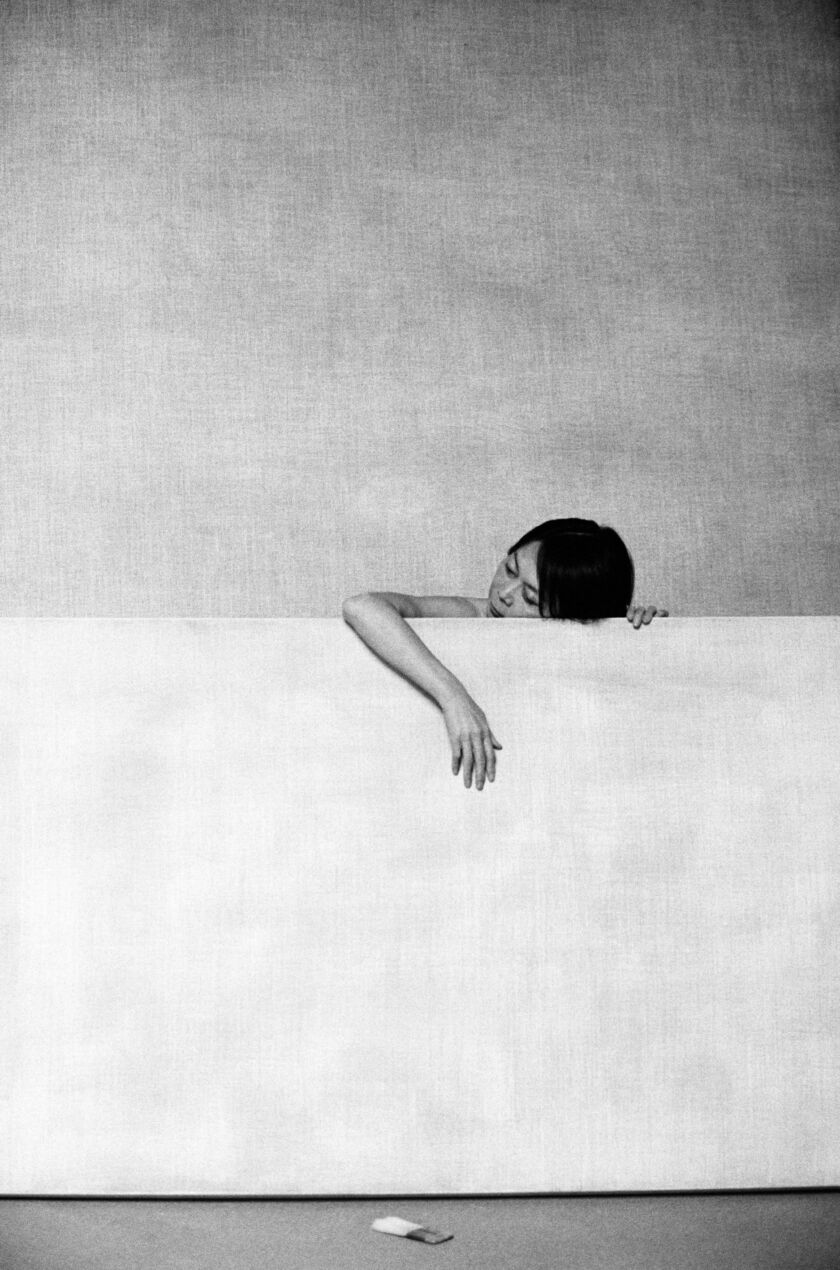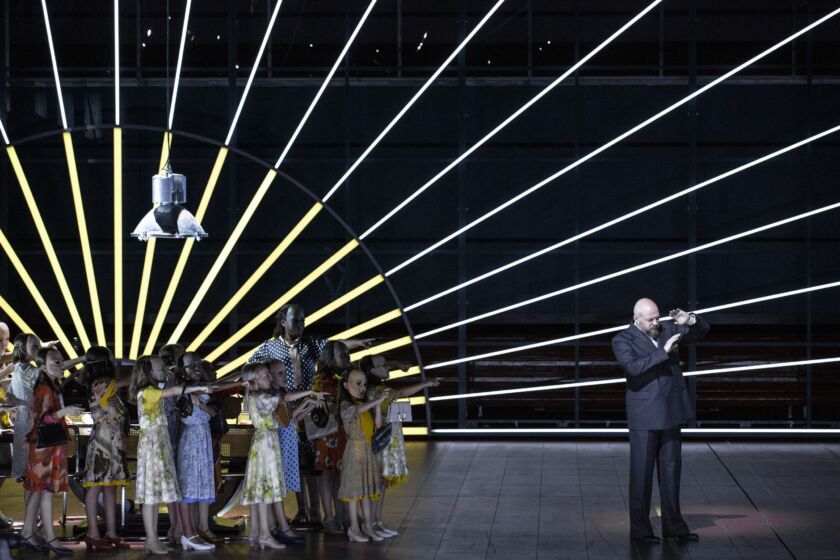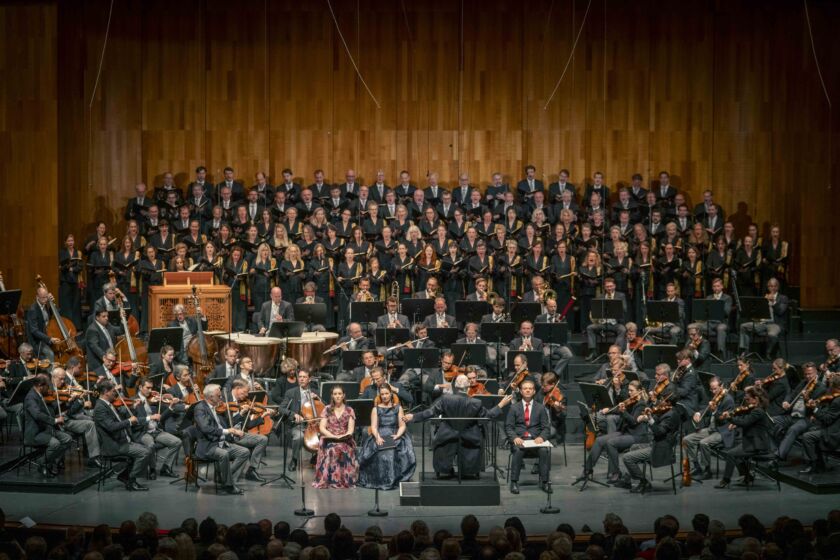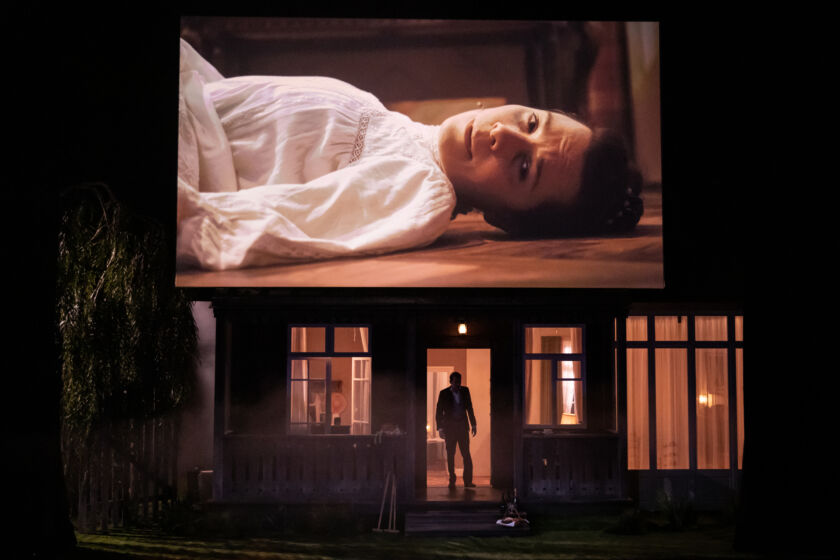“In My End is My Beginning“
Maria Stuart

In times of disconcerting world events, the 2025 Festival programme illuminates historical centres of power and extreme situations in human existence. In the central works of the upcoming Festival summer, our doubts, our loneliness, our fears intensify as under a powerful lens – so do our brightest hopes and longing. They enable us to look the outrageous in the eye, to reflect upon the world and the conditio humana, our existence, within a safe space. As into Mary Stuart’s dress, the words “In my end is my beginning” are woven into the Festival programme.
We examine the historical power centres of Giulio Cesare in Rome and Egypt, Macbeth in Scotland and Mary Stuart in England. Here, the focus is on the mighty. Yet even beyond power, what is at stake is nothing less than the characters’ survival. All the protagonists of these operas are close to the end: whether staring right into it (Macbeth), fearing it (Giulio Cesare), choreographing it triumphantly (Maria Stuarda), longingly calling for it (Three Sisters), or experiencing it in a state of feverish anxiety (Erwartung) or in cosmic repose, having found comfort and spiritual transcendence (Das Lied von der Erde).

The Opera Programme. A craving for power, hubris and excess on the one hand, melancholy passivity, time- and purposelessness, transcendence and escapism on the other – these mark the radius and chronological horizon of the protagonists. They reach for power with all their might, fearfully await the future, and rise to unexpected heights. They desire excessively, suffer in uncertainty, fail hopelessly, and hope – just as we do.
George Frideric Handel’s Giulio Cesare takes us onto a battleground where everyone is fighting everyone else. The loneliness at the pinnacles of power is mercilessly driven home to us. A deadly will for power also has Mary Stuart and Elizabeth I – to Stefan Zweig, the embodiment of a “great antithesis of world history” – locked in a stranglehold. Two queens, two antagonists, two women in the middle of the 16th century.
Caught up within the enticement of powerful prophesies, the Scottish ruler Macbeth in Verdi’s eponymous opera becomes driven by his delusion and his moral fall. An impulse to remove oneself from the world is apparent both in Peter Eötvös Chekhov-inspired opera Three Sisters and in the double bill combining Arnold Schoenberg’s Erwartung and “Der Abschied” from Gustav Mahler’s Das Lied von der Erde, which are united in the production One Morning Turns into an Eternity. In a Mozart project conceived by Raphaël Pichon for Salzburg, the Path of Light is invoked, a vision of being human which remains a dream, an unattainable longing in Eötvös’ opera.

The Concert Programme. Taking up the question raised in the operas – that of free will in human action – this year’s Ouverture spirituelle has chosen the title Fatum (Fate) and features works exploring the fateful determination of our actions. In tragic illustrations of fate, resounding prophesies and choral incantations, divine will is plumbed in music, rebellion and treason are discussed, fatal entanglements are recounted, and individual fates illuminated along with the lot of entire peoples.
For decades, Pierre Boulez had an intimate connection with Salzburg. The Festival became the site of his intense and unforgettable collaboration with the Vienna Philharmonic. In a concert series paying homage to his 100th birthday, the Salzburg Festival commemorates his outstanding work as a composer and a conductor.
In another focus of the concert programme, Dmitri Shostakovich, who died 50 years ago, once again stands for art in the face of extreme social, political and individual pressure. The Russian composer, pianist and pedagogue suffered all his life under the force, threats and disparagement of his homeland. To this day, his works prove how courageous Dmitri Shostakovich ultimately remained, the risks he took – and how much his music has to say about us and our present time.

The Drama Programme. Hofmannsthal’s Jedermann, the Everyman looking back upon his life at the hour of his death, observes his memories coagulating – and yet he experiences redemption: in this character, Salzburg’s venerable – and frequently reevaluated and reinterpreted – play of the end of a powerful man, a rich man reduced to fear in his hour of need, is epitomized.
This “play of dying” is flanked by other “endgames”. They too recount extreme points of human existence. In his monumental end-time drama Die letzten Tage der Menschheit, Karl Kraus offers an incisive analysis of the absurdity of war. Deploying an enormous panopticon of characters, he lays bare the mechanisms of violence, power and propaganda.
In his novel The Blizzard, Vladimir Sorokin assembles a totally different collection of characters as he recounts a fantastical odyssey through rural Russia in a near future. Julien Gosselin’s piece Le Passé, on the other hand, resembles a search for lost time. In his signature combination of theatre, text, images and music, the French director weaves works by the Russian writer Leonid Andreyev into a journey through the past. It is a continual questioning of memory, its pain, but also its beauty. Beginning and end, downfall and redemption, embracing cold and the heart of brightness, life and dream – our ambivalent experiences, our inner battles, the simultaneity of darkness and light, end and utopia: those are just some of the issues this year’s drama programme grapples with.
First published on 31.05.2025 in Die Presse Kultur Spezial: Salzburger Festspiele
